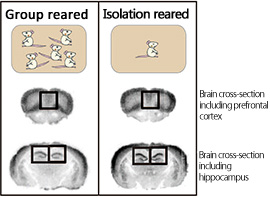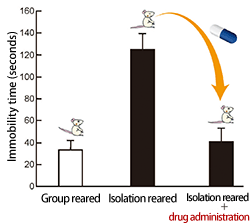|
Social animals such as humans are greatly affected by their environment during cerebral development. Brain activity related to sociality can be studied with mice as a model. For example, mice reared in isolation from other individuals after weaning showed symptoms similar to human depression, such as depression and anxiety.
In recent years, cases of depression have increased, with one person out of six is said to suffer from depression sometime in his/her life, becoming a major social issue. Decrease in nerve transmitters such as serotonin in the brain has been linked to causes of depression, and drugs which increase serotonin are generally used as antidepressant agents. However, problems such as drug efficacy cannot be determined until approximately three weeks after administration, and efficacy is not achieved in approximately 30% of the cases, are currently observed. Therefore, development of new treatment agents is needed.
We focused on the glutamate receptor (mGluR2/3), a molecule which is known to be active in the brain and linked to mental diseases, and compared the amount of this receptor in group-reared mice, and isolation-reared mice over a long period of time. As a result, an increase in mGluR2/3 in the prefrontal cortex and hippocampus was observed in the brains of mice which began to show depression-like behavior due to isolation stress. The prefrontal cortex and hippocampus have been reported to also relate to human diseases, and decreased function and volume have been reported in patients with depression. At this time, in order to observe the relationship between increase in the number of receptors and behavior, drugs to inhibit the mGluR2/3 function were administered to these mice. As a result, improvement in conditions of depression could be observed in comparison with individuals which were not administered the drug.
This study could clarify the possibility that depression occurs due to excessive mGluR2/3 activity. This discovery is expected to lead to the development of new drugs to treat depression which would have completely different effect when compared to drugs used in conventional treatment.
*This research was carried out under the joint research of Functional Probe Research Laboratory Team, Center for Molecular Imaging Science (Hirotaka Onoe, team leader) and Laboratory of Medicinal Pharmacology, Graduate School of Pharmaceutical Sciences, Osaka University (Professor Toshio Matsuda).
* These study results have been published in Neuropharmacology (Volume 60, Issue 2-3, pp. 397-404).
|

Difference in brains due to raising environment.
A difference in the density of glutamate receptors (mGluR2/3) was observed between group reared individuals and isolation reared individuals. The black signal shows areas of higher receptor density.

Antidepressant effect of mGluR2/3 inhibitory agent.
If placed in a glass container with water, a mouse usually actively moves to get out. However, when in a "depressed condition" due to being isolation reared, the mice had a longer time of non-movement. When the drug agent was administered to these mice, immobility time could be shortened, and symptoms improved (bar on the bar graph shows experimental error).
|


